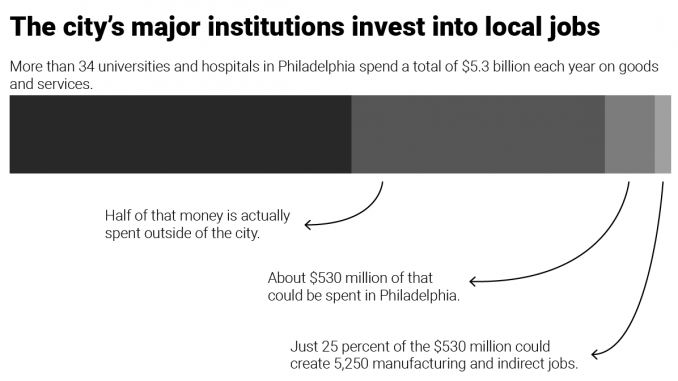
Temple University and Temple Health will be part of a coalition of 13 Philadelphia universities and hospitals that will invest about $530 million into local business organizations.
The Philadelphia Anchors for Growth and Equity program will discuss how to invest more in the city within the next eight to 10 years and create at least 5,000 jobs through finding products from local sources.
Temple, Temple Health, The University of Pennsylvania, Drexel University, and the Children’s Hospital of Pennsylvania are among the 13 founding members of the PAGE program.
According to a report from the Economy League, who is running PAGE, the city’s anchor institutions spend $5.3 billion on goods and services each year, and about half is spent outside of Philadelphia.
Anchor institutions are institutions like universities and hospitals rooted in their local communities by location, invested capital, or relationships with customers, employees and vendors.
“It really went from an idea to a very tangible plan,” said Mariya Khandros, who is the director of shared solutions at the Economy League, and oversees the PAGE program.
The PAGE program first identifies an institution’s needs for goods and services, then works with local businesses to create jobs and produce products or services that meet those needs, Khandros said.
The program was inspired by similar initiatives in other U.S. cities, like New York, to create more job opportunities in Philadelphia, Khandros said. The city’s commerce director, Harold Epps, worked with Jeff Hornstein, the executive director of the Economy League, to develop PAGE.
Epps met Hornstein when he was director of financial and policy analysis for the Office of the City Controller Alan Butkovitz.
Under the City Controller, Hornstein conducted initial studies on the purchasing power of the city’s anchor institutions and what products and contracts could be bought locally. He then brought the project to the Economy League when he came on at the beginning of this year.
“Some of the ZIP codes that are directly geographically attached to Temple’s campus have some of the higher levels of unemployment and poverty in the city and some of the categories that we are trying to combine demand for,” Epps added.
Local sourcing of goods and services can increase employment and investment in North Philadelphia, said Donna Schweibenz, Temple’s director of purchasing.
“What we’re doing is going out within the community and looking for opportunities with smaller businesses, minority- and women-owned businesses, to see the potential to provide goods and services to Temple University,” she said.
“The Economy League provides by pulling all these universities together,” she added. “We’re able to share in best practices in promoting or encouraging the use of local suppliers.”
Temple cannot discuss its specific investment plans, a university financial official told The Temple News.
Moving forward, the focus will be finding ways to connect institutions with local entrepreneurs, Khandros said.
“Having all of our institutions growing in the same direction is really going to make this work greater than [the sum] of its individual parts,” she added.



Be the first to comment